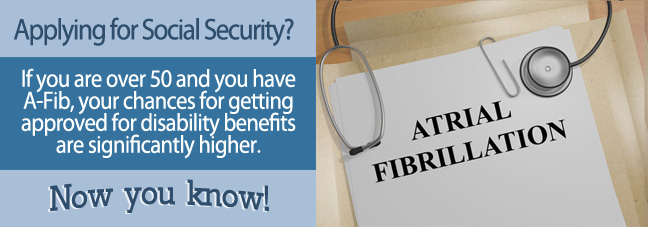If you have been diagnosed with atrial fibrillation and are unable to work, you might be eligible for financial assistance through the Social Security Administration (SSA). Many individuals with atrial fibrillation, or A-fib, qualify for disability benefits as a result of their condition.
Older adults typically have an advantage when it comes to qualifying for Social Security Disability benefits. Given that employers are less likely to hire an older individual as they might present challenges with retraining, the SSA understands that age is a factor when it comes to disability.
The SSA considers advancing age to be a limiting factor in an applicant’s ability to adjust or transition to a new job. Once you reach the age of 50, the SSA will refer to “grid rules” to determine if you qualify for disability benefits. If you are 50-54 years old, you are considered “closely approaching advancing age.”
Grid Rules and Atrial-Fibrillation
If you have atrial fibrillation and you do not meet a medical impairment listing in the Blue Book, the SSA will turn to the grid rules. In addition to your age, the SSA will take into account your education level, work history, and the skills you have acquired over the last 15 years.
To determine your physical capabilities, your claims examiner will perform a residual functional capacity (RFC) assessment. Utilizing medical evidence from your file, the examiner will classify the level of physical activity that you are able to perform, ranging from less than sedentary to very heavy work.
The RFC rating that you receive will indicate the maximum level of work that the SSA feels you are capable of performing.
What Type of Work Can Someone with Atrial Fibrillation Do?
Atrial fibrillation tends to affect the older population, and as such, those who have A-fib may not be able to perform strenuous work, such as in construction. Additionally, A-fib has been shown to be exacerbated by stress.
While all jobs have the potential to carry an element of pressure, high-stress situations may put an individual at increased risk for complications related to their condition.
Individuals with atrial fibrillation are sometimes required to take anticoagulant medications that thin the blood. These medicines increase the risk of bleeding. Therefore, jobs in which you could sustain an injury are advised against if you require these medications.
Those with A-fib are often at risk for syncope, or passing out. Therefore, working a job that involves heights, such as a roofer, would not be recommended. Those with atrial fibrillation would benefit from a low-stress, low-physical impact job.
According to the SSA’s grid rules, a construction worker over the age of 50 without a high school diploma would be more likely to qualify for disability benefits than someone with a college degree and a history of sedentary work, such as an accountant.

What If I Don’t Meet my Grid? Can I still Qualify for Disability Benefits?
Even if you are not classified as disabled according to the grid, you still might be able to qualify for Social Security Disability Insurance benefits for your atrial fibrillation via the Blue Book, the SSA’s official listing of disabilities.
Atrial fibrillation can be found in the cardiac section, 4.05, of the Blue Book under recurrent arrhythmias. You might qualify under a Blue Book listing if you experience the following:
- Fainting or near fainting (syncope) episodes that have occurred at least 3 times over the course of a year, despite medication or treatment
- A-fib that is uncontrolled by medication and unresponsive to treatment
- A-fib that has been documented by EKG
Should I Discuss My Case with a Disability Lawyer or Advocate?
Unless you are having episodes of fainting, you are unlikely to earn disability benefits through the Blue Book listings. However, if you are over the age of 50, and your arrhythmia is making is difficult to work, you may have a better chance of being approved.
As you can see, the Social Security grids are complex. A qualified Disability Attorney or advocate can help you determine the best route to follow when applying for disability benefits. While it might take some time and effort to locate the right lawyer, it will be well worth the time and effort saved down the road.